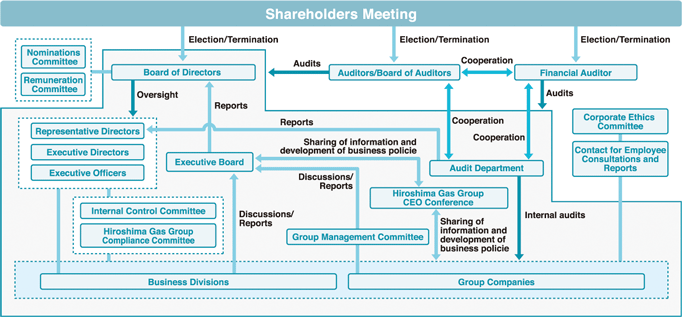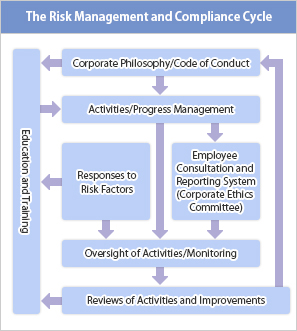Corporate Governance
Basic Position Concerning Corporate Governance
Dedicated to using sound and transparent management to earn the trust of customers, society and shareholdersThe Hiroshima Gas Group is guided by the philosophy of “aiming to be a company that earns the trust of society.” To achieve constant growth of corporate value, we are always taking actions for maintaining and upgrading an effective corporate governance framework in order to ensure that operations are managed with soundness and transparency.
Corporate Governance Structure

Management Framework
Board of DirectorsThe Board of Directors has eleven members, including four outside directors. Directors meet once each month as a rule and at other times as needed. The Board of Directors makes decisions about business operations and supervises how directors with authority for business units conduct their respective operations. In addition, the directors receive reports on the operations of group companies in order to perform overall supervision of management.
Executive Board
The Executive Board consists of six directors who are also executive officers, two internal corporate auditors and eight other executive officers. The Committee meets twice every month as a rule and at other times as needed. Within the limits of the authority granted by the Board of Directors, the Committee makes decisions for the representative directors. In addition, the Committee receives reports about business operations from the Group Management Committee, which is chaired by the general manager of the Corporate Operations Division, and oversees the management of group companies. Board of Auditors
The Board of Auditors has four members that include two outside corporate auditors. All corporate auditors perform investigations in accordance with audit policies and plans established by the Board of Corporate Auditors. The corporate auditors audit the performance of the directors by attending meetings of the Board of Directors and other important meetings and by examining the status of business operations and finances. The corporate auditors ask for business reports from group companies as needed and examine the status of the business operations and finances of these companies. Audit Department
The Audit Department, in accordance with the rules for internal audits, performs audits of Hiroshima Gas and its group companies concerning accounting, business operations, compliance, information systems, risk management and other items. Results of these audits are reported to the company president, Executive Board and corporate auditors. Nominations Committee and Remuneration Committee
These committees, each with outside directors accounting for at least half of the members, discuss and reach decisions about nominations and remuneration. The purpose of these committees is to ensure the objectivity and transparency of processes used for the selection and termination of directors, the selection of corporate auditors, and the determination of the remuneration of directors.
Internal Controls
Basic Policy for the Structure of Internal Controls
The mission of the Hiroshima Gas Group’s business operations is to be a source of suitable services, which include the safe and reliable supply of energy by providing the best combination of city gas and LP gas. Public service and a responsibility to society are critical elements of these business operations.The Basic Policy for Internal Controls was established in order to fulfill this social mission, earn the trust of customers, shareholders, investors, employees and all other stakeholders, and consistently increase corporate value. Risk management and compliance activities are conducted in accordance with this policy.
Risk Management and Compliance Structure

The Hiroshima Gas Group has established the risk management and compliance structure shown on the right for the purpose of translating into actions the philosophy of “aiming to be a company that earns the trust of society.” The objective of this framework is to receive the support of the public as a responsible corporate citizen. We want all group executives and employees to do their jobs with sincerity and fairness as they comply with laws and regulations and ethical guidelines.
Establishment of Code of Conduct
The Hiroshima Gas Group has established Business Rules and Guidelines for Behavior for Hiroshima Gas Group Employee to provide standards for how people do their jobs. Furthermore, we have written a booklet called Using Case Studies to Learn about Compliance that explains various problems for use in training programs. These programs and other activities help ensure that employees conduct business operations properly.Continuous Education
The Hiroshima Gas Group conducts compliance training and compliance awareness surveys on a regular basis. Performing these activities reinforces awareness of the importance of compliance among executives and employees. Another benefit is creating a deeply rooted corporate culture that does not permit violations of laws and regulations or any other improper behavior. In addition, we use groupware for an internal control bulletin board and an internal magazine called GAS LAND in order to distribute information. We also distribute a pamphlet explaining Guidelines for Behavior for Hiroshima Gas Group Employee and Compliance Cards in order to maintain and increase the commitment of executives and employees to risk management and compliance.Framework for Risk Management and Compliance Activities
The Internal Control Committee is responsible for ensuring that Hiroshima Gas and its group companies conduct business operations properly. In addition, the General Affairs Department supervises the risk management and compliance activities of all business units and departments.The Corporate Ethics Committee consists of the company president and two external attorneys. Committee members determine compliance activities and hold discussions about the status of compliance programs and about corrections and revisions for these programs. To strengthen the group’s ability to identify and correct problems internally, there is a Hiroshima Gas Group Employee Consultation and Reporting System that allows any group employee to contact a member of the Corporate Ethics Committee directly.
Risk Management Measures
Periodically and at other times as needed, Hiroshima Gas identifies risk factors that can have a significant impact on business operations. Each risk factor is evaluated and countermeasures are determined. The Executive Board discusses this information and submits reports to the Board of Directors.There is a risk of an earthquake, typhoon, flood, shoreline flooding, tsunami, fire, power interruption or other major disaster or other event causing a disruption in the reliable and safe supply of gas. Hiroshima Gas has established Response Guidelines for Earthquakes and Other Disasters to be prepared for these types of events. Based on these guidelines, Hiroshima Gas can respond to a disaster by using an emergency internal communication system, emergency system for giving directives and orders, and other systems. Drills for a variety of emergencies are conducted on a regular basis in order to minimize damages and other losses if a disaster occurs.
Group Governance
The Hiroshima Gas Group CEO Conference consists of the chief executive officers of group companies. The conference discusses important management activities and other subjects for the purposes of quickly implementing policies and sharing information throughout the group.By establishing rules and taking other actions regarding standards for how group companies conduct business operations, the conference helps reduce vulnerability to risk factors. In addition, some Hiroshima Gas executives also serve as executives at major consolidated subsidiaries to facilitate the direct oversight at the Boards of Directors of these subsidiaries of their management and business operations. Important matters involving the management of group companies are first discussed by the Group Management Committee and the results of these discussions are reported to the Executive Board.
There is a Hiroshima Gas Group Compliance Committee for the purpose of increasing the effectiveness of compliance activities. Committee members perform oversight to confirm that group companies have suitable compliance frameworks and are properly using these frameworks.
